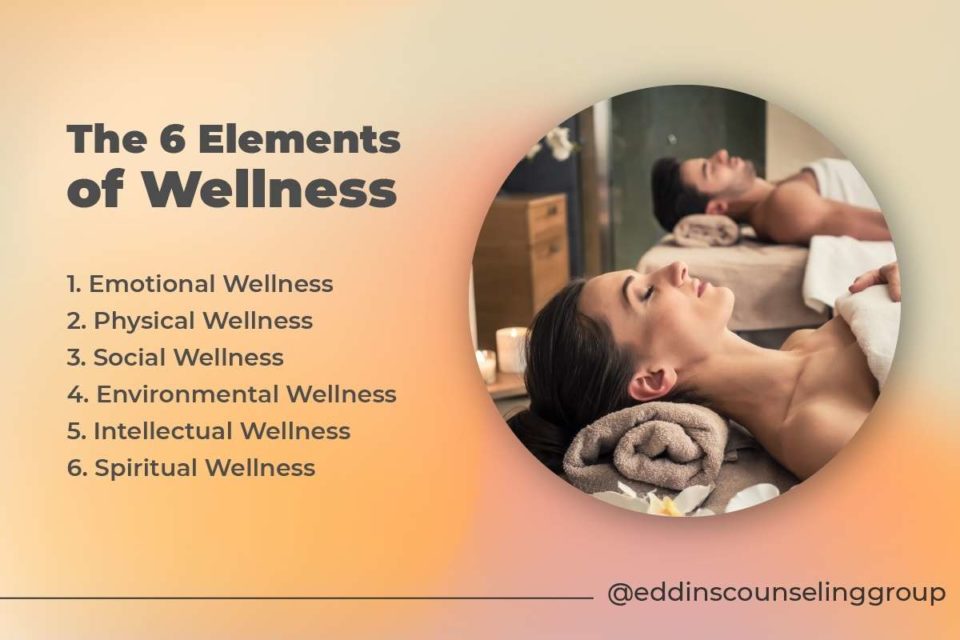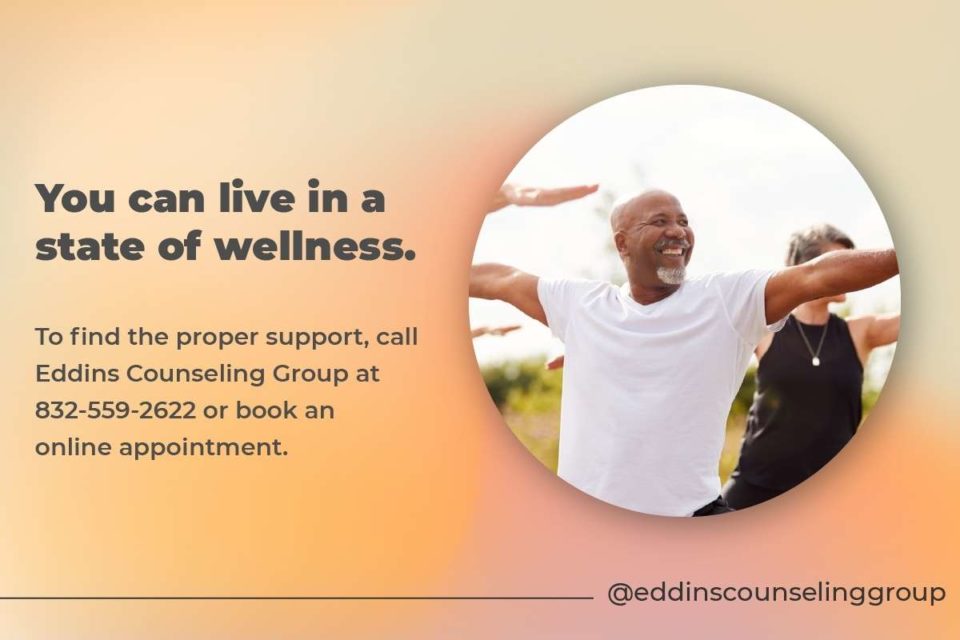May 30, 2022
Wellness: What Is It?
Written by Rachel Eddins
Posted in Self Help / Personal Development and with tags: self care, wellness

What does the term “wellness” mean to you?
Right now, in the midst of an ongoing health-related tornado, it might not be so easy to define the concept of wellness. But it is important to remember that wellness is a “whole life” scenario. It is not something that is mandated or anything that comes in a bottle, jar, or box.
Wellness is also not a destination at which you arrive.
A productive definition of this term must position it as an evolving process. Each of us directs the trajectory as we see fit. Generally speaking, there are six broad elements involved in this holistic, conscious pursuit.
The 6 Elements of Wellness
1. Emotional Wellness
The desire to improve one’s wellness often rises from emotional awareness. You understand yourself as a discrete entity. You identify your own thoughts, beliefs, and ideas. You’re comfortable expressing them. Equally, you’re curious to learn more about the thoughts and behaviors of others.
2. Physical Wellness
This is usually what comes to mind first when we consider wellness. The physical component is maintained through a clear intention to practice self-care. Such a regimen will include:
- Healthy eating habits
- Regular sleep patterns
- Daily exercise and activity
- The eschewing of habits that can harm you
- Relaxation techniques and stress management
3. Social Wellness
Part of why you’d want to sustain emotional and physical well-being is that they contribute to your social life. You are part of a social species and thus, part of a community. Therefore, when interacting with others, you want to relate to them and communicate in a healthy manner.
4. Environmental Wellness
How you view your personal environment can range from your living space to the entire planet. A state of environmental wellness involves care-taking for your surroundings in a micro and macro way. This requires you to comprehend your role in the world at large.
5. Intellectual Wellness
Just as you train and use your physical muscles, your mind needs similar attention. Intellectual wellness is often characterized by:
- Remaining to new ideas, even when they differ from yours
- Continuing to learn
- Being creative
- Solving problems
- Processing all you come in contact with
- Connecting with others
6. Spiritual Wellness
The word “spiritual” can provoke some strong reactions. Part of spiritual wellness is sitting with those reactions and allowing yourself to dig deeper. This will enable you to develop a sense of meaningful purpose in your life. In addition, spiritual wellness guides us to contemplate our very existence.
Wellness Applied
Look around at all the unnecessary divisions in the world. They are often driven by male narratives and artificial intelligence algorithms. As more and more people embrace whole-life wellness, better outcomes are inevitable. In such a setting, we can:
- Work together to build stronger, healthier networks
- Strive to reach our full potential
- Lead by example
- Develop stronger and more durable self-worth and self-esteem
- Emphasize our strengths
- Be more creative and innovative
- Recognize our interdependence
- Connect via shared values, beliefs, and goals
Wellness Enhanced
A key component of holistic wellness is interconnectedness. Among many things, this means we are more aware that help is always available.
Take a closer look at the six elements of wellness described above. If you find any or all of them needing repair, mindful therapy is the ideal venue.
Whole Life Wellness is Preventative
Long before the pandemic, health care was a hot topic. Rarely, if ever, during such debates do you hear anyone evoke the word “wellness.” Wellness is not something done in reaction to a problem — as is the case with most Western medicine.
Wellness focuses on making big connections while practicing preventive measures.
High tech interventions have their time and place. But, maintaining optimal health requires attention to be paid to whole-life wellness. I’ve told you a little about the six elements of wellness. Let’s dig deeper.
What Are the Benefits of the 6 Elements of Wellness?
1. Emotional Wellness Benefits
As the name implies, this is about your emotions. Learning a valuable skill like emotional regulation can dramatically improve all aspects of your mental health.
Additionally, it enhances your interactions and relationships. If you cannot manage your own emotions in a productive way, it is usually difficult to create healthy connections with others.
2. Physical Wellness Benefits
This is where traditional perceptions of fitness and health come into play. We’re not talking about big muscles or tight butts — but they may come along in the deal.
When you care for your body, you take pre-emptive steps to safeguard it. In return, you reap many benefits, e.g.
- High energy and youthfulness
- Healthy digestive functioning
- Strong immune system
- Robust recuperative powers
- Flexibility, strength, balance, and more
3. Social Wellness Benefits
No person is an island. We dwell in an interactive culture. Thanks to modern technology, we can make contact with other humans all over the world.
Social wellness empowers us to cultivate healthy relationships with someone we live with and/or someone on the other side of the globe. These bonds are founded on respect, trust, curiosity, and confidence.
4. Environmental Wellness Benefits
How livable is your home, your neighborhood, your workplace, or your social circle? We each live in multiple environments and contribute — one way or another — to their wellness. A healthy environment does not happen by accident. It is the result of conscious efforts from those who mindfully aim for environmental wellness. In return, you can feel safe, welcome, and comfortable.
5. Intellectual Wellness Benefits
Life is complex. Without intellectual wellness, it may also feel overwhelming, confusing, and infuriating. Things will not always go our way. Not everyone agrees with each other. Problems arise and may create stalemates.
The antidote to such realities is intellectual wellness. It arms us with the wisdom, patience, awareness, and resourcefulness to navigate the ups and downs.
6. Spiritual Wellness Benefits
You may or may not practice a religion. That is your choice. Spiritual wellness, however, is not tied to any specific dogma, tradition, or practice.
It can be but it can also exist on its own. At the risk of oversimplifying, spiritual wellness encourages the exploration and development of ideas like:
- Living a meaningful life
- Finding your purpose
- Discovering the morals and values that guide you
- Settling on the beliefs and ethics that inspire you
- Trying to understand your place in the world and in the universe
- Making the world a better place, leaving it better than how you found it
Where Do You Begin?
If you’ve read this post, I would say you have already begun! You are curious and eager to learn more.
That’s where we come in. We have worked with innumerable clients who have desired whole-life wellness. Through our weekly sessions, they have improved the quality of their life in all the ways described above.
You can live in a state of wellness. With the proper support, you can utilize the tools you have and the tools you will develop to live a more fulfilling life.
Please read more about health coaching and counseling for life transitions, and contact us for support. With therapists in Houston Heights, Houston Montrose, and Sugar Land and online therapy, we hope to meet you at a time and place that is convenient for you!
Lastly, be sure to attend our free, monthly Focus on Wellness webinars.
Why You Feel This Way
Get instant access to your free ebook.
Grounding & Self Soothing
Get instant access to your free ebook.
7 Mood-Boosting Tips
Get instant access to your free ebook.





















